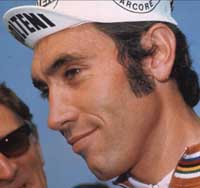Merckx: Cycling will recover from recent doping scandals
Five time Tour de France winner Eddy Merckx believes that cycling will recover from its recent doping scandals.

"The illness is terrible, the situation always serious, but there are some signs of life," Merckx said in Friday's edition of Gazzetta dello Sport. "There are many honest people. I think that three-quarters of the group is clean."
This year's Tour was marred by numerous doping offenses. Race leader Michael Rasmussen was expelled by his Rabobank team for allegedly lying about his whereabouts to evade doping controls, while pre-race favorite Alexandre Vinokourov and Cristian Moreni were forced out for failing doping tests.
Alberto Contador of Spain won the prestigious multistage race, but some media reports have even linked him with the Spanish blood-doping investigation known as Operation Puerto.
"At the Tour, there weren't cases of team doping but of individuals that involved their teams," Merckx said.
Vinokourov's positive test for a banned blood transfusion after winning the 13th stage led to his Astana team's withdrawal. The same happened to Moreni's Cofidis team following his positive test for testosterone after the 11th stage.
Merckx, who won the Tour from 1969-72 and in '74, said those that dope were risking more than just getting caught.
"Riders who dope are playing Russian roulette with their lives," Merckx said.
The 62-year-old Belgian added that serious doping offenses should carry lifetime bans.
"There is doping and doping. I wouldn't ban Alessandro Petacchi for a couple of sprays too many, particularly since he has a medical certificate. But I'd have no mercy for blood transfusions."
Petacchi of Italy tested positive for elevated levels of an asthma drug during the Giro d'Italia. His national cycling federation cleared him of any doping violation, saying he had a legitimate reason for using the medication. However, the Italian Olympic Committee has appealed the ruling and wants him banned for one year.
Before this year's Tour, all racers signed a new UCI charter, saying that they were not involved in doping, will not breach anti-doping rules, and promising to submit DNA samples to Spanish authorities in the Operation Puerto investigation. Cyclists also had to agree to pay a year's salary on top of a two-year ban if caught cheating.
Subscribe to Pravda.Ru Telegram channel, Facebook, RSS!


